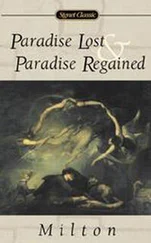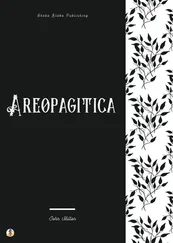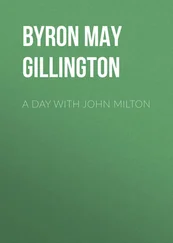And yet more med'cinal is it than that Moly
That Hermes once to wise Ulysses gave.
He called it Haemony, and gave it me,
And bade me keep it as of sovran use
'Gainst all enchantments, mildew blast, or damp,
Or ghastly Furies' apparition.
I pursed it up, but little reckoning made,
Till now that this extremity compelled.
But now I find it true; for by this means
I knew the foul enchanter, though disguised,
Entered the very lime–twigs of his spells,
And yet came off. If you have this about you
(As I will give you when we go), you may
Boldly assault the necromancer's hall;
Where if he be, with dauntless hardihood
And brandished blade rush on him: break his glass,
And shed the luscious liquor on the ground;
But seize his wand. Though he and his curst crew
Fierce sign of battle make, and menace high,
Or, like the sons of Vulcan, vomit smoke,
Yet will they soon retire, if he but shrink.
ELD. BRO. Thyrsis, lead on apace; I'll follow thee;
And some good angel bear a shield before us!
The Scene changes to a stately palace, set out with all manner of deliciousness: soft music, tables spread with all dainties. Comus appears with his rabble, and the LADY set in an enchanted chair; to whom he offers his glass; which she puts by, and goes about to rise.
COMUS. Nay, Lady, sit. If I but wave this wand,
Your nerves are all chained up in alabaster,
And you a statue, or as Daphne was,
Root–bound, that fled Apollo.
LADY. Fool, do not boast.
Thou canst not touch the freedom of my mind
With all thy charms, although this corporal rind
Thou hast immanacled while Heaven sees good.
COMUS. Why are you vexed, Lady? why do you frown?
Here dwell no frowns, nor anger; from these gates
Sorrow flies far. See, here be all the pleasures
That fancy can beget on youthful thoughts,
When the fresh blood grows lively, and returns
Brisk as the April buds in primrose season.
And first behold this cordial julep here,
That flames and dances in his crystal bounds,
With spirits of balm and fragrant syrups mixed.
Not that Nepenthes which the wife of Thone
In Egypt gave to Jove–born Helena
Is of such power to stir up joy as this,
To life so friendly, or so cool to thirst.
Why should you be so cruel to yourself,
And to those dainty limbs, which Nature lent
For gentle usage and soft delicacy?
But you invert the covenants of her trust,
And harshly deal, like an ill borrower,
With that which you received on other terms,
Scorning the unexempt condition
By which all mortal frailty must subsist,
Refreshment after toil, ease after pain,
That have been tired all day without repast,
And timely rest have wanted. But, fair virgin,
This will restore all soon.
LADY. 'T will not, false traitor!
'T will not restore the truth and honesty
That thou hast banished from thy tongue with lies.
Was this the cottage and the safe abode
Thou told'st me of? What grim aspects are these,
These oughly–headed monsters? Mercy guard me!
Hence with thy brewed enchantments, foul deceiver!
Hast thou betrayed my credulous innocence
With vizored falsehood and base forgery?
And would'st thou seek again to trap me here
With liquorish baits, fit to ensnare a brute?
Were it a draught for Juno when she banquets,
I would not taste thy treasonous offer. None
But such as are good men can give good things;
And that which is not good is not delicious
To a well–governed and wise appetite.
COMUS. O foolishness of men! that lend their ears
To those budge doctors of the Stoic fur,
And fetch their precepts from the Cynic tub,
Praising the lean and sallow Abstinence!
Wherefore did Nature pour her bounties forth
With such a full and unwithdrawing hand,
Covering the earth with odours, fruits, and flocks,
Thronging the seas with spawn innumerable,
But all to please and sate the curious taste?
And set to work millions of spinning worms,
That in their green shops weave the smooth–haired silk,
To deck her sons; and, that no corner might
Be vacant of her plenty, in her own loins
She hutched the all–worshipped ore and precious gems,
To store her children with. If all the world
Should, in a pet of temperance, feed on pulse,
Drink the clear stream, and nothing wear but frieze,
The All–giver would be unthanked, would be unpraised,
Not half his riches known and yet despised;
And we should serve him as a grudging master,
As a penurious niggard of his wealth,
And live like Nature's bastards, not her sons,
Who would be quite surcharged with her own weight,
And strangled with her waste fertility:
The earth cumbered, and the winged air darked with plumes,
The herds would over–multitude their lords;
The sea o'erfraught would swell, and the unsought diamonds
Would so emblaze the forehead of the deep,
And so bestud with stars, that they below
Would grow inured to light, and come at last
To gaze upon the sun with shameless brows.
List, Lady; be not coy, and be not cozened
With that same vaunted name, Virginity.
Beauty is Nature's coin; must not be hoarded,
But must be current; and the good thereof
Consists in mutual and partaken bliss,
Unsavoury in the enjoyment of itself.
If you let slip time, like a neglected rose
It withers on the stalk with languished head.
Beauty is Nature's brag, and must be shown
In courts, at feasts, and high solemnities,
Where most may wonder at the workmanship.
It is for homely features to keep home;
They had their name thence: coarse complexions
And cheeks of sorry grain will serve to ply
The sampler, and to tease the huswife's wool.
What need a vermeil–tinctured lip for that,
Love–darting eyes, or tresses like the morn?
There was another meaning in these gifts;
Think what, and be advised; you are but young yet.
LADY. I had not thought to have unlocked my lips
In this unhallowed air, but that this juggler
Would think to charm my judgment, as mine eyes,
Obtruding false rules pranked in reason's garb.
I hate when vice can bolt her arguments
And virtue has no tongue to check her pride.
Impostor! do not charge most innocent Nature,
As if she would her children should be riotous
With her abundance. She, good cateress,
Means her provision only to the good,
That live according to her sober laws,
And holy dictate of spare Temperance.
If every just man that now pines with want
Had but a moderate and beseeming share
Of that which lewdly–pampered Luxury
Now heaps upon some few with vast excess,
Nature's full blessings would be well dispensed
In unsuperfluous even proportion,
And she no whit encumbered with her store;
And then the Giver would be better thanked,
His praise due paid: for swinish gluttony
Ne'er looks to Heaven amidst his gorgeous feast,
But with besotted base ingratitude
Crams, and blasphemes his Feeder. Shall I go on
Or have I said enow? To him that dares
Arm his profane tongue with contemptuous words
Against the sun–clad power of chastity
Fain would I something say;—yet to what end?
Thou hast nor ear, nor soul, to apprehend
The sublime notion and high mystery
That must be uttered to unfold the sage
And serious doctrine of Virginity;
And thou art worthy that thou shouldst not know
More happiness than this thy present lot.
Читать дальше












